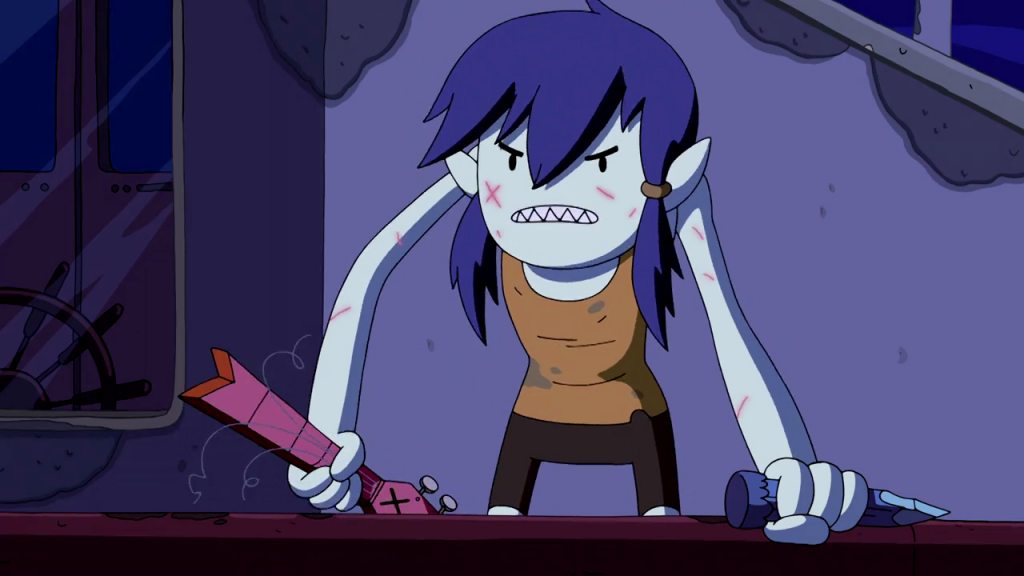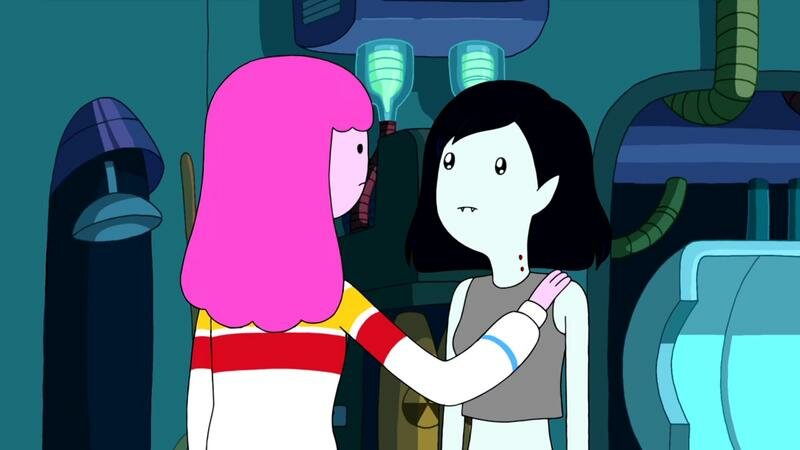Why Adventure Time: Stakes is One Of the Greatest Pieces Of Modern Television
Adventure Time: Stakes is a lot of things. It’s a coming of age story about a character who’s a thousand years old when we first meet her. It’s an intellectually curious story about life, death, and how we create and find meaning. It’s a fun vampire hunting adventure reminiscent of the best of Buffy the Vampire Slayer. But most of all, it’s great TV.
Stakes is an eight episode miniseries in the 7th season of Adventure Time focused on the aftermath of Princess Bubblegum (aka PB, Bonnie) “curing” Marceline (aka Marcy) of vampirism. The process, which makes Marceline mortal, returns a group of vampires to life whose souls Marceline had sucked and powers she had absorbed (she’s half demon by birth). The majority of the miniseries then follows our heroes as they hunt down the (re-)resurrected vamps, interspersed with flashbacks to Marceline’s past.

It’s in these flashbacks that the miniseries lays the emotional foundation of its central coming of age narrative. At the start of the second episode of the miniseries, we get a string of flashbacks that show moments in Marceline’s past. Each of these highlight a significant relationship in her life that ended, for a variety of reasons, leaving Marceline alone in the world. First, her mother comforts her when she is a very young girl, then Ice King/Simon leaves her as a slightly older child because he is too dangerous to be around. Finally, in her teens, she meets a group of humans who first fear her, then welcome her, and ultimately also leave her behind when they leave Ooo because of the many threats there, including vampires.
Whether intentionally or not (we don’t get specifics for what happened with her mother), many of Marceline’s primary relationships, including caregivers, left her alone in the world. And the final group left her in part because they were attempting to escape the threat of vampires. It makes perfect sense then that when the vampires return, Marceline pushes her friends away to take them on herself.
She quickly realizes the error of this approach when she is bested in a fight by the vampire known as the Empress and is saved by Princess Bubblegum, with Finn and Jake in tow. But even in this instance of Marceline challenging a vampire on her own, she only did so to save Ice King/Simon, she was still motivated by her care for another. It’s only in the final episode of the miniseries, when after an apparent happy ending, a seemingly unstoppable monster of pure vampire essence is loosed upon the world, that Marceline reaches her lowest point and gives up on trying to make things better for herself or even engaging with the world. She says “trying to fix me made things a thousand times worse, so why even try, you know?” and genuinely, painfully asks “What’s the point?” The two tiered disavowal of needing and being needed by others here deepens Marcy’s despair in the final episode, thus making her return to hope more meaningful.
And the return does come. After an anti-pep talk from the Ice King, he not only sympathizes with her refusal to engage the world, but in fact pushes her to remain removed so that she might better survive, like cockroaches and rats. Marceline enters the fight, saves the world, and in the process becomes a vampire again by absorbing the vampire essence.

Marcy’s return to being a vampire solidifies Stakes as a quintessential hero’s journey story. The status quo of her life as a vampire is disrupted by her wish to be “cured,” the cure returns the vampires to life, and she is called to defeat them. In doing so, she endures trials and develops her relationships with her allies. There is a moment when all hope seems lost, but ultimately she overcomes her despair and the world is returned to the status quo, but she is changed. This cyclical nature of the story is then explicitly hit upon in both the lyrics of the closing song “Everything Stays” and in the dialogue of the final episode of the miniseries.
The key repetition in “Everything Stays” is “everything stays, but it still changes,” perhaps the shortest summary of the hero’s journey narrative archetype, which also functions as a general comment on existence. Beyond the lyrics though, we first hear the song when Marceline’s mother sings it as a comfort song to young Marcy in the first flashback of the miniseries, so it serves as an example of one of the things that stays while things still change when Marcy plays the song to herself at the end of the miniseries.
Just before Marceline quite literally plays us out of the miniseries though she tells her friends:
“I’m cool being a vampire again. Being mortal was good… At the same time, it was terrifying. Now I’m a vampire with fresh mortal memories and—I don’t know—more empathy or something… More grown-up.” Again about as tight a bow as we can get on a narrative that brings us back to the beginning state.
But it’s the final part of this mini-monologue that brings us into the way the miniseries engages with its key theme of mortality. Marceline says, “Bonnie, thank you for helping me grow up. Now, I guess we get to hang out together forever.” The final line isn’t just lovely (especially given that we see PB blush as Marcy says it), it also ties together the miniseries’ key themes of the importance of relationships and (im)mortality.
Jake also brings these themes together earlier in the miniseries. When the temporarily mortal Marceline has been poisoned in a fight, and PB blames herself for Marcy being in fatal danger, Jakes tells PB “Marcy took a risk and you helped her because you’re her friend. Real friends take each other to the edge of death, cause death is life!” It’s a line that might be considered irresponsible in (what’s ostensibly) children’s entertainment, but it voices a commonly cited and valuable philosophical stance: that death gives life meaning. Both by emphasizing the fragility of life, and by giving it a deadline.

But it’s far from the only viewpoint we’re given on the relationship between life, death, and meaning. Early in the miniseries, we get a simple, but potent, line from the Empress when the vampires mysteriously return to life/undead. As they discuss how and why they have been returned, and where and when they might be, the Empress firmly states “It doesn’t matter where we are or when we are, because: we are.” Swap out “where” and “when” with “how” and “why” and this is about as simple as the existentialist position gets.
Beyond dialogue that explicitly states different views on its themes, the miniseries also offers Marceline’s vision of her potential mortal future, and her past oriented vision at the moment of her (not quite) death. When Marceline is poisoned, she dreams of herself as old, gently playing the bass in Princess Bubblegum’s cabin, while Peppermint Butler digs a grave outside and a still young PB walks over to kiss her on the head. At the other end of her life, the rush of flashbacks at the start of the second episode of the miniseries are quite literally visions of Marceline’s life flashing before her eyes. In a brilliant use of irony, Marceline has these visions, just as she is about to be hit by the rays of the rising sun, which would be fatal to her as a vampire, but she does not die by the rays because she has been cured of her vampirism and made mortal.
That each of the flashbacks highlight important relationships in Marceline’s life, and that her vision of the end of her life centers on Princess Bubblegum, are what most reveal the heart of the miniseries. And when Marceline tells PB that now they get to hang out forever, we’re getting what amounts to a thesis on immortality, that while death may give life meaning, it is our relationships that are the most meaningful aspect of existence. Marceline’s immortality is not a curse to be fixed, and her immortal life has meaning if she can be immortal with Princess Bubblegum (who just so happens to be the love of her neverending life).
Beyond these more ~sophisticated~ successes in emotional and thematic heft, Stakes is also just fantastically watchable. In an early episode of Adventure Time, Jake tells Finn that any great story needs “excitement, romance, suspense, and … a happy ending.” While we might quibble with these criteria, Stakes certainly meets them all. As a story about vampires, there’s more than enough opportunity for suspense. The fights between our heroes and the vamps offer excitement, and the rekindling romance between Princess Bubblegum and Marceline creates some wonderful moments for vicarious butterflies.

It’s also filled with jokes. Jake struggles with his fear of vampires throughout the miniseries, leading to an ongoing bit about his attempts and failures to overcome that fear. We get to hear Peppermint Butler’s adorably anxious inner monologue about his hopes to get the Vampire King’s autograph. And one of the greatest bits in all of Adventure Time when Jake mostly fails to give Peppermint Butler helpful descriptions for sketches of the vampires.
There’s more to say about Stakes. I could go on about the way it develops the tertiary characters, advances the larger plot of Adventure Time, gives more consideration to the incomprehensibility of life and the attendant anxiety, and how it’s simply the best part of Adventure Time because it focuses on the best ensemble combination in the show. But it’s Marceline’s story and the miniseries’ emphatic statement on how love gives life meaning that make it most special, and one of the greatest pieces of television of the 21st century.
If you’d like to read more of Kyle’s work, you can check it out here!